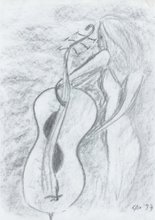Education
From La Lengua comes the following; [English translation follows in the square brackets]
“Hoy, dando una clase de Lengua Castellana, ha venido a cuento hablar de la antigua Roma y de los acueductos. Y de cómo la ingeniería romana republicana e imperial les permitía realizar obras impresionantes hace 2.000 años. «Y no sólo hace 2.000 años -he continuado-, sino incluso hace más».
La mayoría de mis alumnos, de entre trece y quince años, me ha mirado con los ojos como platos. Finalmente, uno se ha atrevido a preguntar: «¿Hace más de 2.000 años?»”
[Today, giving a Castellano Language class, I began to tell the story of the Romans and their aqueducts. And how the engineers of the Roman Republic and Imperial States were able to realise such impressive works 2,000 years ago. “And not only 2,000 years ago,” I continued, “But even before that.”
The majority of my students, of between 13 and 15 years of age, looked at me with eyes like saucers. At last, one of them asked the question, “More than 2,000 years ago?”]
Even after explaining that the world is some 4,600 million years old, and that people have been around for a lot longer than the 2,007 years that follow the birth of Christ, his students still did not look convinced. What follows is a discussion of the education system in Spain, and asks how it is possible that those teenage children did not realise that the world has existed for more than 2,007 years. Furthermore, he goes on to say that it is the government’s fear of upsetting the various religions that has led to such a failure in the education of the young, and that is fostering the exact conditions that lead to fundamentalist behaviours. I had to respond, regardless of my paltry Spanish.
It is a truly terrifying thought that students anywhere could believe that the history of the world is only 2,007 years old, but sadly I can believe it. It is getting the same here in the UK. With government legislation constantly attacking educational practice, teaching is more and more about passing exams than developing critical thinking and fostering an inquiring mind. The government is more and more concerned about offending religions and cultures, continuing to narrow down the curriculum and impose yet more legislation/political correctness, to the point where stories such as The Three Little Pigs have been banned in some schools. (I guess that's another can of worms altogether, eh). There seems to be a growing fear of asking questions in case of offending someone or other. I'm not saying we shouldn't be aware of other cultures, and I am all in favour of promoting multi-culturalism, but it should not, must not, get in the way of allowing our children to do what they do best - ask and enquire about the world around them.
I trained as a primary teacher, have a teenage daughter, and teach at university level, so I’ve seen all age phases, and I am seeing a real failure in our education system. In England we have a National Curriculum that I fear is killing creativity in the classroom and murdering any sense of curiosity in our children due to over-prescribed subject areas and a constantly changing methodology. I cannot blame the teachers. They are struggling to meet targets, to have x number of exam passes etc or face losing their jobs/funding. I was so disappointed with the whole affair that I left primary and for a while, wanted to take my own children out of school!
But these problems, initiated in the early – and crucial - stages of education, are now filtering through to University level as well. I find a large proportion of my undergraduate students are unable to reason, or put forward an argument using evidence and research, let alone the decline in basic skills. Religion is another problem, as one student a few years ago took great offence when I was discussing the evolution of the vocal tract from apes to humans, saying they refused to be told they had evolved from a monkey. That aside, I find too many students, year on year, are increasingly narrow minded and lacking in basic written and verbal skills. Many of them have no concept of discovering answers for themselves and spend their first semester in shock at the fact that my job is to get them thinking, to give them avenues of enquiry to follow, to inspire them (one would hope!), and to turn them into independent learners, and not, as they all too often assume, to provide them with all the answers on a plate.
I don’t know what the answer is, but I’ve heard proposals that the voting age should be reduced to 16, which is a terrifying thought for a whole host of reasons, not least because if they can’t even manage to read two opposing statements, and understand that the statements are in opposition, how on earth are they going to be able to make decisions that should be based on an in depth critique of each political party’s ethics, beliefs and policies weighed up against their own infomed opinions.
I remember reading an article in The Times Educational Supplement some years ago, about it snowing outside a primary classroom window, and what a shame it was that the teachers were unable to take the children out into the yard, to get them exploring their world hands on, and inspiring them to ask questions. Instead the children remained inside being drilled for SATs tests, to meet government targets and attain Levels – and no doubt being kept safe from the inherent dangers of snow!
We, as teachers, need to battle against bureaucracy, and do what we do best; share our love of learning, foster the enquiring mind, share and explore the world around us, and venture into the past – even if that means before 2,007 years ago. How on earth can we expect the future generation to know where it is going if it doesn’t even know where it came from? I despair at times, I really do!






















No comments:
Post a Comment